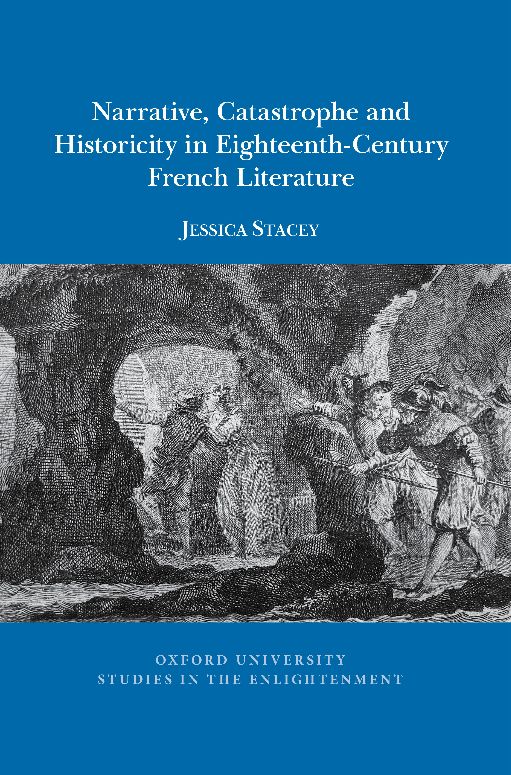
Jessica Stacey, Narrative, catastrophe and historicity in eighteenth-century French literature
New from Oxford University Studies in the Enlightenment:
Narrative, catastrophe and historicity in eighteenth-century French literature
By Jessica Stacey
How do communities tell and re-tell stories of catastrophe to explain their own origins, imagine their future, and work for their survival? This book explores this question, so vital for our present moment, through narratives produced in eighteenth-century France: a tumultuous period when a “modern” national history was being elaborated.
- Brings contemporary work on the catastrophic imaginary into dialogue with philosophies of historical time and the study of eighteenth-century medievalism, offering a fresh perspective on how and why communities retell past catastrophes, and imagine future ones.
- Drawing on a wide variety of literary, historical and philosophical sources from the late seventeenth to the early nineteenth centuries, the book illuminates the pre- and remediation of catastrophes by showing how the same stories and motifs were reworked by writers over the course of the eighteenth-century.
- This book shows how French eighteenth-century writers viewed their own history as a haunting past, instantiated in the dangerous but also attractive figures which menace to crowd out the present, and return it to a catastrophic Dark Age: barbarians, usurpers, lost heirs, prophets, ghosts and martyrs.
***
“We, too, have seen our connections and analogies come loose; a sense of the pandemic as a repetition of something from the past has ceded as the many threads of distinct future problems become clearer, just as the early ‘we’re all in this together’ narratives have unravelled. The book is a work of critique, seeking in part to expose embarrassments, narratives that go nowhere, attempts to recast contemporaries as anachronisms.”
(Read the author’s accompanying blog post)
***
Table of Contents:
A Note on Translation
Preface and Acknowledgements
Introduction: Authors of Catastrophe
Chapter 1. Bringing Catastrophe: barbare (br)others, in and around the Encyclopédie
Chapter 2. Suffering Catastrophe: legitimate and illegitimate lines in Baculard d’Arnaud’s medievalist works
Chapter 3. Prophesying Catastrophe, Predicting Utopia: the time travellers of Mercier’s prose tableaux
Chapter 4. Witnessing Catastrophe as Revelation: doing time with Latude and Sade, modern martyrs
Conclusion
Works Cited
***
Jessica Stacey is a Career Development Fellow in French at The Queen’s College, Oxford and has a PhD from King’s College London. Her research interests include catastrophe and time, civilisation and barbarism, story and community; she has also published on Antillean volcanoes and queer readings of Rousseau.
The Oxford University Studies in the Enlightenment series, previously known as SVEC (Studies on Voltaire and the Eighteenth Century), has published over 500 peer-reviewed scholarly volumes since 1955 as part of the Voltaire Foundation at the University of Oxford. International in focus, Oxford University Studies in the Enlightenment volumes cover wide-ranging aspects of the eighteenth century and the Enlightenment, from gender studies to political theory, and from economics to visual arts and music, and are published in English or French.